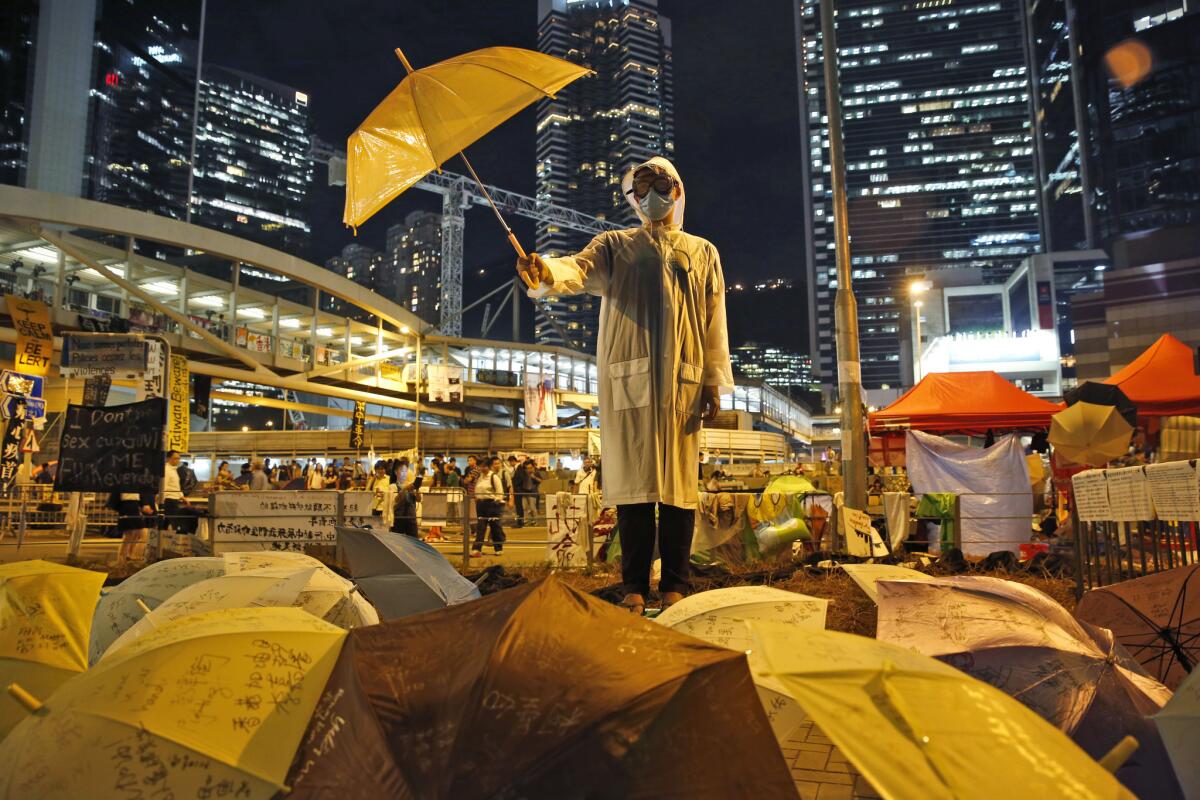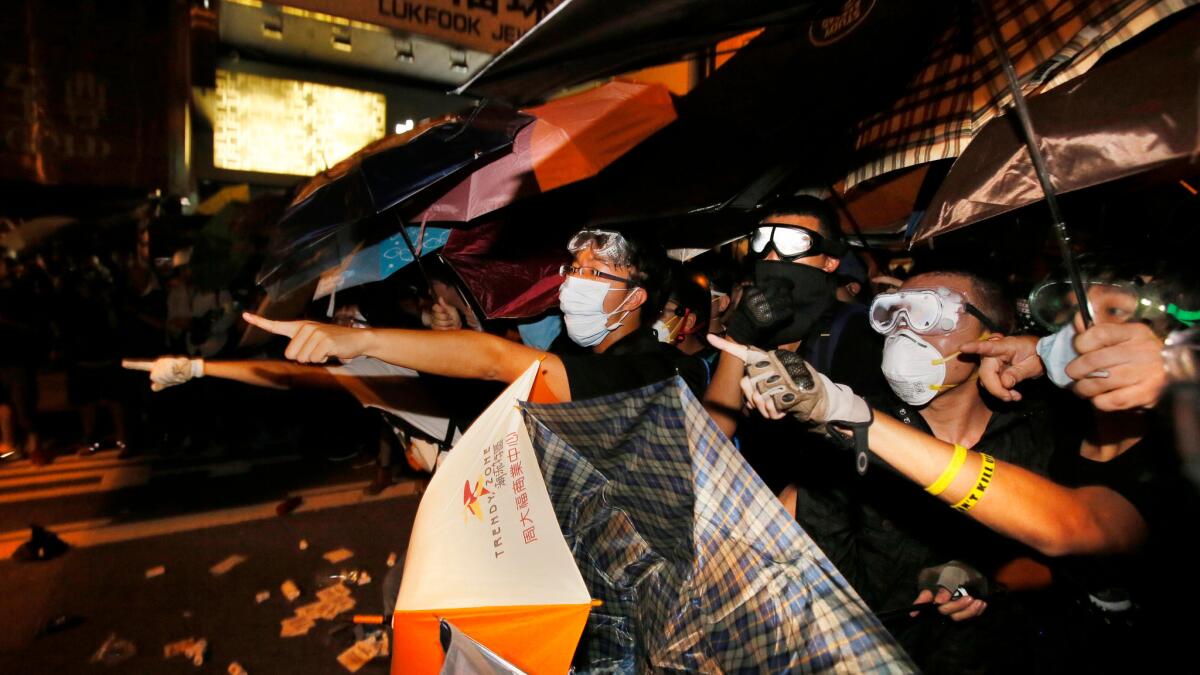Two years after ‘Umbrella’ protests, Hong Kong prepares to vote on its future

- Share via
Reporting from Beijing — Just under two years ago, Hong Kong was in turmoil. Tens of thousands of students took to the streets, demanding that Beijing give them the freedom to elect their next top leader by 2017. They sang songs, waved banners and slept in tents along major thoroughfares; police shot tear gas canisters and beat them back with batons.
Yet in the end, Beijing made no significant concessions, and 79 days after the so-called “Umbrella Movement” began, it fizzled out. Many observers declared it a failure.
This Sunday, Hong Kong residents will, in fact, go to the polls — to elect several new members to the city’s 70-seat legislature. This is the semi-autonomous Chinese territory’s first general election since the protests, and it’s playing out against a backdrop of heated controversy and worsening social divisions.
Here’s what’s happening, and why it matters.

What’s the background here?
When Hong Kongers talk about their city’s future, it’s usually a conversation about its relationship with China’s central government. Since 1997, Beijing has ruled the former British colony of 7.3 million people under a “one country, two systems” framework. Beijing takes care of the city’s defense and foreign affairs, while the city enjoys civil liberties unavailable on the mainland: an independent judiciary, uncensored Internet, unrestricted media. The agreement is set to expire in 2047, when Beijing will take full control.
Yet many Hong Kong residents are worried that in recent years, the “two systems” part of the arrangement has begun to slip — that pro-Beijing interests have been influencing local media, courts and businesses.
It’s important to note that Sunday’s election is not the one for which the Umbrella Movement protesters were fighting — in June 2015, local opposition defeated Beijing’s plan for electoral reform in 2017, which barred “unpatriotic” candidates from running for the city’s top office. So next year, the chief executive, as in years past, will be chosen by a 1,200-member committee of elites, many of them pro-Beijing.
What’s happening on Sunday?
Enter the Legislative Council — known colloquially as “LegCo” — Hong Kong’s legislature and mini-parliament. Candidates who resent and resist pro-Beijing legislation hope to win at least 24 seats so they can act as a bulwark. There’s no guarantee that it will happen.
“After Umbrella, society is torn and polarized,” said Jason Y. Ng, a Hong Kong attorney and author of “Umbrellas in Bloom: Hong Kong’s occupy movement uncovered.”
Many Hong Kong residents, especially older generations, are weary of constant protests; they fret over the economy, which has suffered as mainland visitors seek out friendlier destinations. Yet the younger generations “want to fight tooth and nail,” Ng said. “It’s a sign of extreme frustration and anger after Umbrella failed to achieve any tangible results, despite them having spent some 79 days camping out on the streets.”
Sunday’s election is “a referendum on the competing ideologies,” he said. “Competing visions of the city’s path forward.”
Why is everyone so worked up?
One word is hanging over the elections like a cloud: “independence.”
Talk of independence used to exist only on the absolute fringes of Hong Kong’s political discourse — after all, Beijing is inextricable from several key aspects of Hong Kong life, including the supply of fresh water, its foreign policy and its defense.
Yet since the Umbrella Movement failed to win any significant concessions, many Hong Kong residents are now considering more extreme modes of protest, and talk of independence has become borderline mainstream. “Two years ago, people would laugh if you mentioned the word independence,” Ng said. “Today, it’s a serious political topic.”
Although the city has seen a profusion of pro-independence, “nativist” and “localist” organizations and political parties since 2014, they remain in the minority, and most Hong Kongers dismiss the notion of full independence as a fantasy.
How has the independence movement fared in these elections?
Several pro-independence candidates have attempted to run for LegCo, and in August, Hong Kong’s Electoral Affairs Commission barred Edward Leung — a college student who previously had advocated for Hong Kong independence — from running, even after he signed a declaration stating that Hong Kong is an “inalienable part” of China.
Five other lower-profile, pro-independence candidates have been barred from running, according to the South China Morning Post newspaper, with the commission claiming that their pro-independence stance violates the Basic Law, the city’s mini-constitution.
Yet the prohibitions seem to have given the independence movement more momentum. A July study by the Chinese University of Hong Kong found that 17.4% of Hong Kong residents support eventual independence. And in August, after the six candidates were barred from running, the city saw its first pro-independence rally. Thousands attended.
How does Beijing feel about all of this?
Predictably, both Beijing and establishment Hong Kong politicians have been incensed by the development. In early August, the Chinese state-run, nationalistic Global Times tabloid called Hong Kong independence a “false political proposition” and a “farce.” This week, a top advisor to the Hong Kong government, Cheung Chi-kong, said that the city’s schools should avoid discussing independence, arguing that it was akin to discussing how to rob a bank or commit suicide.
Local authorities are clearly on edge: Hong Kong police will deploy at least 5,000 officers on polling day as a bulwark against any localism-related unrest, the South China Morning Post reported.
What happens if the pro-Beijing camp wins? What about the pro-independence types?
If the pro-Beijing camp comes out ahead, Chinese authorities could gain even more influence over the city’s affairs. The non pro-Beijing camp already has enough seats to be influential; if it wins 24 on Sunday, it will be able to preserve the status quo.
Although pro-independence candidates remain on the ballot, their poll numbers are weak, and none is expected to win. Ng said that even if one did, the path ahead would be uncertain — the pro-independence camp has, up until now, been more talk than action. “As long as the localist candidates are outside the LegCo, their haloes are intact,” he said. “But once they’re in, they’ll have nowhere to hide but deliver results.”
Correspondent Violet Law contributed to this report from Hong Kong.
ALSO
How a burial ceremony in Kabul turned deadly, illustrating Afghanistan’s political crisis
13 killed, dozens wounded as suicide bombers target a Christian colony and a courthouse in Pakistan
More to Read
Sign up for Essential California
The most important California stories and recommendations in your inbox every morning.
You may occasionally receive promotional content from the Los Angeles Times.













